Published
7 months agoon
By
Adubianews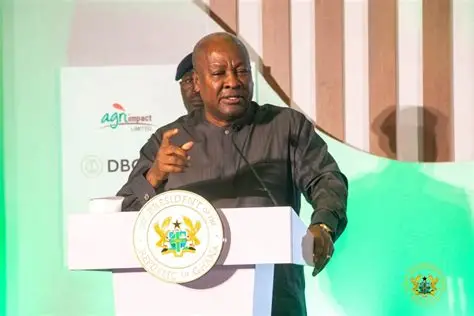
President John Mahama has urged African leaders, institutions, and citizens to move beyond symbolic statements and take bold, coordinated steps to address the continent’s deep-rooted historical injustices. Speaking in Accra at the 13th African Union High-Level Dialogue on Democracy, Human Rights, and Governance, the President emphasised that reparative justice must become a tangible mandate, not just another declaration.
“We gather here not only to examine our painful past,” President Mahama stated, “but to shape a different and better future for our continent, where African agency, sovereignty, and dignity are restored and respected.”
This year’s AU Dialogue, themed “Justice, Rights, Reparations, and State Building,” brought together representatives from AU member states, civil society, academia, and international partners. The platform encourages consensus on democratic governance and human rights in Africa.
President Mahama pointed out that colonialism, slavery, and systemic exploitation are not relics of the past but persistent forces influencing current African realities. From artificially imposed borders to unjust global economic structures, Africa’s present-day struggles remain deeply tied to its historical traumas.
“For far too long, the architecture of African states has rested on foundations imposed during a colonial era that neither understood nor respected our histories, our cultures, or our aspirations,” he said. Ghana, he added, has been a consistent voice for Pan-African justice—from Kwame Nkrumah’s legacy to modern-day advocacy for reparative policies.
However, he warned against empty rhetoric. “This dialogue cannot afford to become another ceremonial event filled with lofty speeches but void of action,” he cautioned.
President Mahama called attention to rising frustrations among the youth, who, according to him, are demanding justice and inclusion. “Our citizens are watching and waiting. Our young people… are growing increasingly impatient. They demand fairness. They demand opportunity. And a stake in our continent’s future,” he said.
He commended the African Union Executive Council for extending the 2025 reparations theme into a Decade of Reparations (2026–2036) and for establishing two new bodies: the AU Commission of Experts on Reparations and the AU Reference Group of Legal Experts on Reparations. Mahama described these steps as “critical milestones” but urged prompt implementation.
“We must now move swiftly to personalise these instruments,” he noted. “We must empower these bodies with the resources, visibility, and mandate to lead us on this noble journey of truth, justice, and restitution.”
The President also stressed the need to protect civic freedoms across Africa. He encouraged the AU to endorse legally binding frameworks that ensure freedoms of assembly, speech, and participation.
“Democracy cannot thrive in the presence of fear or repression. The legitimacy of our governments depends on the inclusion of all our people. Governments must exist for all, and not just a few,” he declared.
He also urged governments to promote civic and political education through school curricula and community engagement platforms. “Widespread civic disengagement is not simply a matter of apathy,” he said. “It is often the result of exclusion, mistrust, and systemic failure.”
In his concluding remarks, President Mahama called on stakeholders to ensure that the Accra Dialogue becomes a turning point. “Let this not be merely a meeting of minds. But a moment of continental reawakening. Let us make this dialogue count. Let us not merely reflect, but let us act,” he stressed.
The Chairperson of the African Union Commission, Mr. Mahmoud Ali Youssouf, echoed Mahama’s sentiments. He emphasised the need for a shared vision of justice, peace, and prosperity in Africa.
“The vision for a prosperous, democratic, and peaceful Africa must be shared,” Youssouf said. “Justice, including reparative justice, peace, and stability, must be the cardinal principles, the cornerstones of our transformation.”


NPP Communicator Blames Mahama in Interview Over Viral Video Controversy
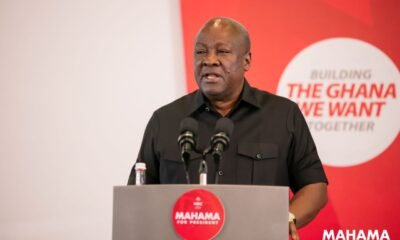

President Mahama Begins Three-Day State Visit to Zambia to Deepen African Cooperation
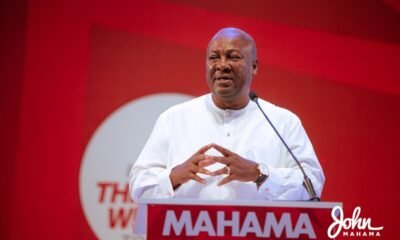

Mahama Warns Ghana’s Security Remains Fragile Amid Rising West African Instability
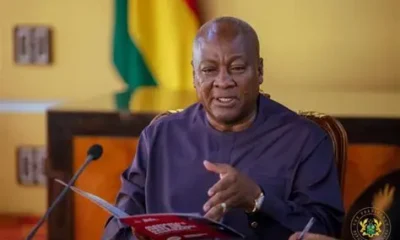

Mahama Calls for Urgent Economic Reforms to Drive Africa’s Development


Mahama to Lead First Accra Reset Davos Convening at World Economic Forum
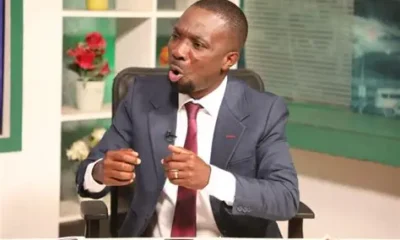

Mahama’s Failure Not Needed for Bawumia’s Presidency – Campaign Spokesperson
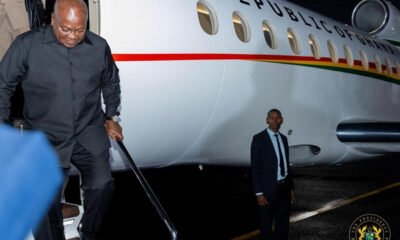

President Mahama Travels to UK and Davos for Global Economic Engagements


Mahama Says Tough Reforms Have Set Ghana on a Sustainable Path


Mahama Marks One Year in Office with National Thanksgiving Service

























